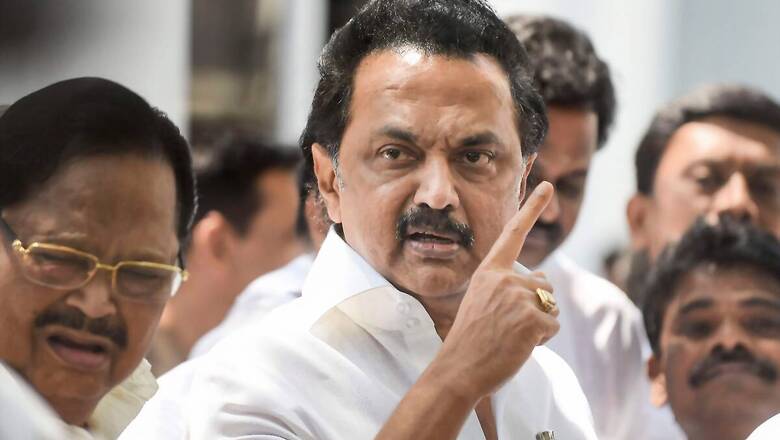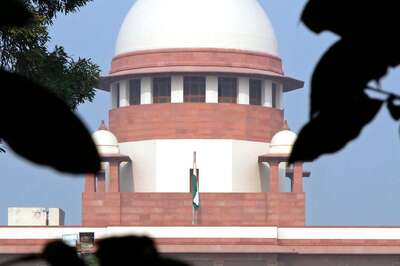
views
MGR and M. Karunanidhi were sworn political enemies. This enmity continued between Karunanidhi and J. Jayalalithaa. One would have thought an election not involving these three political giants will be without any acrimony, or at least will be a low-key affair. But that has not been the case.
Over the last week, leaders from various political parties have, in their campaign beat, made nasty statements. These have set chain reactions, claims, counter-claims and whataboutery. Television advertisements have reached the levels of negativity seen only in the US. FM radio advertisements are just as bad. On Thursday, a full-page print ad from the DMK went after the BJP and the AIADMK in a vicious manner.
The DMK’s core campaign this time revolves around three key points: (1) the BJP’s communalism, (2) the AIADMK’s slavish subservience to the BJP and (3) loss of federalism and Tamil pride at the hands of the BJP-AIADMK combine. This, they have depicted by way of a series of cartoons in the full-page advertisement.
The first cartoon depicts Tamil Nadu Lignite Corporation, with a board ‘No vacancy for Tamils’, showing a person sitting inside, spitting paan. In the Tamil xenophobic mindset, all North Indians are paan-spitting, uncouth fellows and the ad depicts this blatantly.
Then, there is a caricature of BJP leader H. Raja, one of the only two Brahmin candidates in this election from the major parties, who is seen asking a young boy, “Why are you going to school? Go to your ancestral job!” This is a veiled reference to Rajaji, the Brahmin chief minister of the Congress government in the 1950s, who tried bringing a legislation in 1953 called “Modified Scheme of Elementary Education”, which was dubbed by its opponents, most notably Periyar E.V. Ramasamy, as ‘Hereditary Job Scheme’. To this day, Tamils know it only by the name Periyar had used.
ALSO READ| Playing Songs, Making Dosas, Washing Clothes: How Parties, Candidates are Campaigning in Tamil Nadu
The purpose of the scheme was to reduce the school time and introduce two shifts, thereby double the number of students in schools. The additional time students had was to be utilized for learning any job. But the animosity Periyar had towards Rajaji in particular and Brahmins in general made him state that this was a way of enforcing varnasrama on Shudras by a Brahmin chief minister. To this day, Brahmin politicians in Tamil Nadu have to bear that cross, as seen in this advertisement.
The AIADMK for its part is saying that a vote for the DMK is a vote for rowdyism and land grabbing. Politicians of major parties have indulged in rowdyism, or at least encouraged shady elements. Assigning all of that to the DMK makes no sense. Same is the case with land grabbing. In fact, the biggest land grabbers have been Sasikala and her relatives, aided by Jayalalithaa, between 1991 and 1996. There is a detailed testimony by film music director Gangai Amaran, who incidentally is now in the BJP, against Jayalalithaa and Sasikala on how he was threatened and his farm land captured by hired goons, as part of the deposition in the disproportionate assets case against them.
There have been accusations against M.K. Stalin too with some alleging that a part of the land on which the DMK’s headquarters is built was illegally grabbed. Jayalalithaa faced similar allegations over Kodanad estate and Siruthavur bungalow. Later, in 2011, when Jayalalithaa became the chief minister again, she set up special cells to punish land grabbers. Naturally, all the cases were only against the DMK members. Many of these cases have not been disposed off to date.
Autonomy, an emotive issue
Other states in India also have similar battles—communalism vs secularism, corruption vs clean administration, development vs backwardness. In Tamil Nadu, however, federalism and autonomy find a pride of place. There is a long history to this, starting from Periyar, who was against North Indian-dominated Congress party. There were calls for secession from the Indian Union around the time of Independence. Periyar did not want to celebrate August 15, 1947 and instead wanted to mourn the day as one when the North Indians subjugated Tamilians.
The DMK’s founder Annadurai disagreed with Periyar. While he did not contend the basic point of Periyar, he felt that a momentous occasion such as the Independence Day should not be insulted. However, Annadurai continued Periyar’s fight into Parliament and argued against the imposition of Hindi or any measure that would take away the power of a state government. He warned that there were reasons why Tamilians wanted to secede from the Indian Union and maintained this stance until the 1962 Chinese war.
ALSO READ| In Tamil Nadu, the Wheel Has Come Full Circle for the Dravidian Parties
The DMK has, however, championed state autonomy on a variety of issues, most particularly in education and jobs. The opposition against NEET, the medical entrance exam, is a case in point. No other state has questioned this exam, but the DMK considers this exam as against the interests of the Tamils on two counts: (a) it enforces a uniform, centrally administered test, (b) it allows upper castes, notably Brahmins, a better representation. The DMK’s opposition to the Economically Weaker Section quota of 10 per cent is on similar lines, and it has not been implemented in Tamil Nadu; it may never be.
The DMK and its allies have repeatedly complained about North Indians writing entrance exams and getting into Railways, Neyveli Lignite Corporation (now NLC India Limited) and other central government institutions.The presence of Hindi-speaking CISF staff in Tamil Nadu airports has attracted sharp criticism from the DMK. The central government application forms, including the election commission’s voter information slip in English and Hindi but not in Tamil, have caused considerable consternation among Tamils.
While the AIDMK also protests against these measures, the DMK has run away with the mantle of ‘Protector of Tamil Language and Culture.’ The DMK has consistently protested against the central government’s creeping control over taxation, legislation and policy making. The AIADMK has not been so vehement in its protests in recent times. Jayalalithaa was a harsh critic of the GST and would not budge until her death, but Tamil Nadu caved in after her demise.
Will the DMK succeed in converting this angst into votes? Will its messaging through cartoons, a mix of truth, exaggeration and falsities, yield results? How will the AIADMK and the BJP respond, given that they have only three days left before Tamil Nadu goes to polls?
This is turning out to be one of the most acrimonious elections ever fought in Tamil Nadu.
This is the seventh in a series on Tamil Nadu elections by the author.
Read all the Latest News, Breaking News and Coronavirus News here. Follow us on Facebook, Twitter and Telegram.




















Comments
0 comment